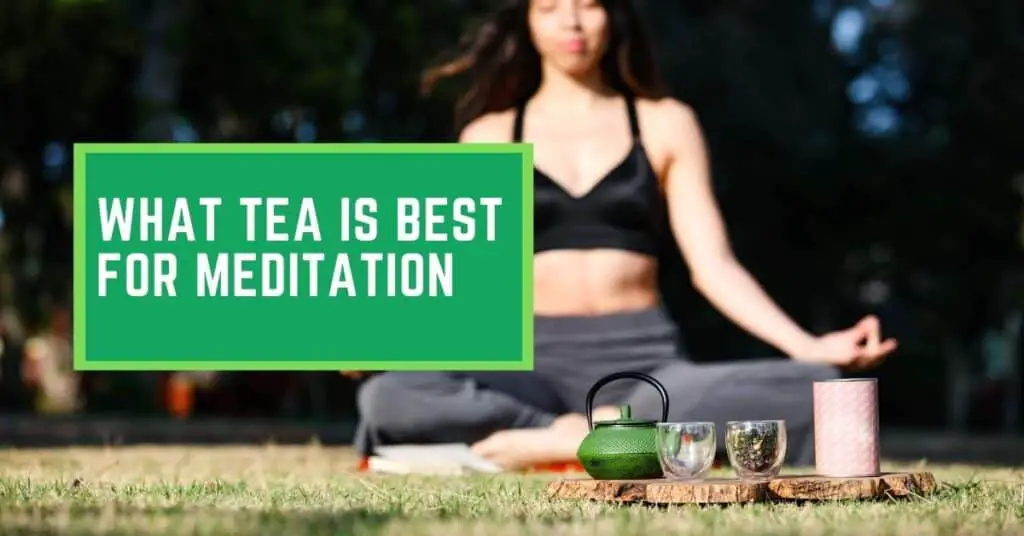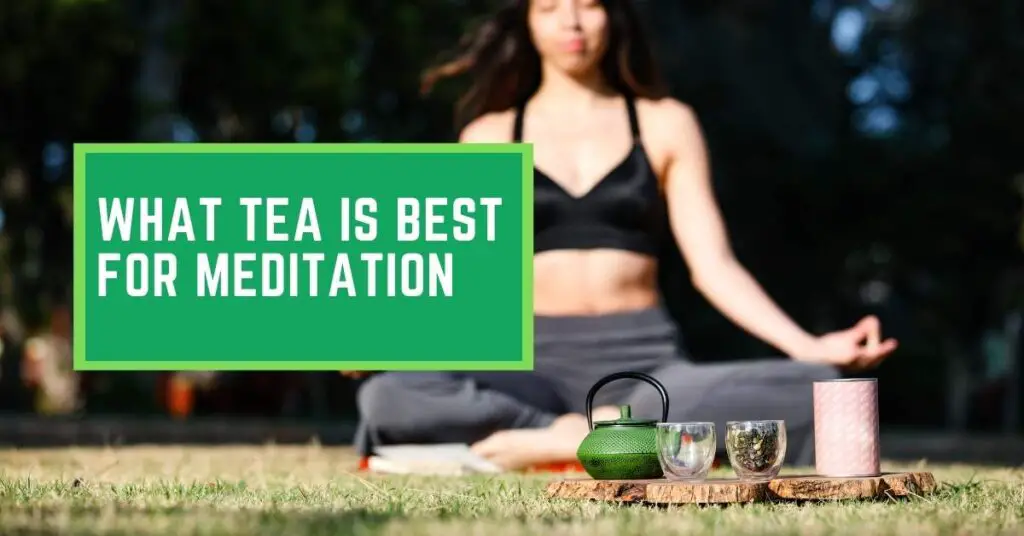There is nothing like a cup of hot tea to relax and rejuvenate oneself.
Tea has been around for centuries and is enjoyed by people all over the world. There are many different types of tea, each with its own unique flavour and characteristics.
Some of the most popular teas come from China, Japan, Sri Lanka and India.
These countries have been perfecting the art of tea production for centuries and their teas are highly sought after by tea aficionados.
Tea helps us to manage different tasks of us, one best example of that is Meditation. In this article, we look at the best tea for meditation and its different aspects.
It’s not very easy to identify the best tea for meditation, as the best tea for meditation will vary depending on your individual preferences.
However, most people find that a lighter tea, such as green tea is a good choice for meditation, as it doesn’t have too strong of a flavour and it isn’t overly stimulating. Also, people find that green tea or chamomile tea is especially calming and soothing for meditation.

However, If you’re not sure which tea is right for you, it may be worth experimenting with a few different kinds until you find one that really resonates with you.
Green Tea

Green tea is a type of tea that is made from Camellia sinensis leaves that have not gone through the oxidation process.
This makes green tea a “non-fermented” tea, and as a result, it has high levels of polyphenols (antioxidants) and catechins, which are believed to be beneficial for human health.
Some of the possible health benefits associated with green tea consumption include improved cardiovascular health, weight loss, cancer prevention, and improved cognitive function.
Recommended Products
01. FGO Organic Green Tea – Loose Tea

FGO Organic Green Tea – loose leaf tea allows you to customize each cup according to your preference, and there’s no unnecessary waste from bags or strings. Plus, all our products are certified USDA Organic by California Certified Organic Farmers (CCOF), so you can be sure you’re getting the best quality possible. A great choice for green tea lovers, our Gunpowder Green Tea is smooth, flavorful, and perfect for any occasion.
02. Bigelow Green Tea – Teabags
Bigelow Green Tea is a delicious and healthy tea that provides essential antioxidants. It comes individually wrapped in foil pouches for peak flavour, freshness, and aroma. It’s gluten-free, calorie-free, and Kosher Certified. There’s tea for the morning, noon, and nighttime relaxation. Try our English Breakfast, Vanilla Chai, antioxidant Green Tea, decaffeinated teas, organic teas and a variety of our herbal tea bags.
03. VitaCup Green Tea – Instant Sticks

VitaCup Green Tea will help you protect your cell health and fight free radicals! With a boost of antioxidants from natural caffeine, EGCG, and L-theanine, this unique blend of essential vitamins will also help to boost your energy and metabolism so you can conquer the day. Our Green Tea is fresh and soothing, made with ingredients sourced from Asia to honour the rich history of this healthy beverage.
Processing of Green Tea
The processing of green tea inside the human body is a two-step process. In the first step, green tea is turned into black tea. In the second step, black tea is turned into brown sugar.
Green tea contains high levels of polyphenols, which are antioxidants that help protect the body against damage from free radicals. Free radicals are unstable molecules that can cause damage to cells, leading to inflammation and the development of diseases like cancer.
The polyphenols in green tea are broken down into smaller molecules during the first step of processing. These smaller molecules are then turned into black tea in the second step. Black tea contains lower levels of polyphenols than green tea, but it also contains caffeine and other compounds that can have positive effects on health.

Types of Green Tea
– Chinese Green Tea: Chinese green tea is a type of tea that originates from China. It is typically made from leaves of the Camellia sinensis plant, which are steamed and then rolled before being dried. The finished tea leaves are often twisted or curled and have a characteristic green colour. When brewed, Chinese green tea has a delicate flavour and aroma, with grassy and vegetal notes.
– Japanese Green Tea: Japanese green tea is a type of tea that is made from leaves of the Camellia sinensis plant. The leaves are steamed, rolled and dried, and then often ground into a powder. This tea is typically produced in China and Japan. Japanese green tea is known for its unique flavour and health benefits. Some of the most popular types of Japanese green tea include sencha, bancha, and matcha.
Tastes of Green Tea

There are many different types of green tea, each with its own unique flavour. Some common varieties include matcha, sencha, and gunpowder tea. Matcha is a powder made from green tea leaves that are typically used in Japanese tea ceremonies. It has a grassy, umami flavour. Sencha is a type of green tea that is steamed and rolled during processing, resulting in a bright green colour and a slightly astringent taste. Gunpowder tea is made from leaves that have been rolled into pellets, giving it a strong, slightly bitter flavour.
Other Benefits of Green Tea
The benefits of green tea include reducing the risk of cancer, heart disease, and dementia. Additionally, green tea can help with weight loss, improve alertness and mental focus, and has anti-inflammatory properties.
Green tea contains polyphenols (chemical compounds) called catechins, which are antioxidants that help protect cells from damage. One particular catechin called epigallocatechin gallate (EGCG) is thought to be responsible for most of the health benefits of green tea.
Some specific benefits of green tea include:
– Reducing the risk of cancer: Green tea is thought to reduce the risk of certain types of cancer, including ovarian, prostate, breast, and colorectal cancers.
– Fighting heart disease: The antioxidants in green tea may help to protect the heart from damage, reducing the risk of heart disease.

– Reducing the risk of dementia: Studies have shown that the antioxidants in green tea may help to protect against Alzheimer’s disease and other forms of dementia.
– Aiding weight loss: Green tea is often touted as a weight loss aid, and there is some evidence to support this claim. One study showed that those who consumed green tea lost more weight than those who didn’t.
– Improving mental focus: The caffeine in green tea can help to improve mental focus and alertness.
– Reducing inflammation: The antioxidants in green tea may help to reduce inflammation throughout the body.
Alternative Teas that helps Meditation
01. Peppermint Tea: Peppermint tea is a type of herbal tea that is made from the leaves of the peppermint plant. Peppermint tea has a refreshing, minty taste and is often used to help soothe stomach upset and relieve indigestion. Peppermint tea is also thought to have some antimicrobial properties, making it a good choice for helping to fight off colds and flu.
02. Chamomile Tea: Chamomile tea is brewed using the dried flowers of the chamomile plant. Chamomile tea has a slightly sweet, honey-like flavour and can be enjoyed hot or cold. Chamomile tea is traditionally used for its calming and relaxing properties. Some studies have shown that chamomile tea may also help to reduce anxiety and promote sleep.
Related Matters
01. Is it true that tea helps meditation?
There is some scientific evidence that tea may help with meditation. For example, one study showed that tea helped people to focus their attention and maintain their task performance during a period of sustained mental effort.
Tea contains compounds called catechins, which have been found to have various health benefits, including improved mental clarity and focus. Additionally, tea contains caffeine, which has been shown to improve cognitive function and boost energy levels.
So overall, it seems that tea can be a helpful ally in meditation practice. However, it’s important to note that everyone is different and you may need to experiment a bit to see if tea works for you in this context.
02. How much caffeine is contained in green tea?
Generally speaking, green tea contains less caffeine than black tea. However, the exact amount of caffeine in green tea can vary depending on the type of tea and the brewing method. For example, matcha green tea powder has more caffeine than traditional green tea leaves. So if you’re trying to limit your caffeine intake, it’s important to pay attention to how much green tea you’re drinking.
03. What is the best way to prepare green tea?
When it comes to preparing green tea, there are a few key things to keep in mind. First, be sure to use fresh, cold water when brewing. Second, don’t over-boil the water – green tea should be brewed at a lower temperature than black tea. And finally, don’t steep for too long – 3-5 minutes is usually sufficient. Once you’ve got the basic techniques down, experiment with different teas and steeping times to find what you like best!
04. Green teas are good for which age groups and health conditions?
Green tea is good for all age groups and health conditions! It is full of antioxidants and has numerous health benefits. Some of these benefits include improving cardiovascular health, preventing cancer, and boosting brain function. Green tea is also a great way to improve your overall vitality and well-being. So, if you’re looking for a healthy beverage to add to your diet, green tea is a great choice!
05. How do you meditate with tea?
There’s no one-size-fits-all answer to this question, as the best way to meditate with tea will vary depending on what works for you. However, here are a few tips to get you started:
– Choose a calm, comfortable spot to sit in. Make sure there are no distractions around so that you can focus on your tea meditation.
– Start by taking a few deep breaths and allow yourself to relax. Then, hold your cup of tea in both hands and take a sip, savouring the taste and aroma.
– As you drink your tea, pay attention to the sensations in your body and mind. Notice how the warmth of the tea makes you feel and how the flavours and aromas affect your senses.
– Take your time and allow yourself to be fully present in the moment. When you’re finished drinking your tea, take a few more deep breaths and slowly return to reality.












